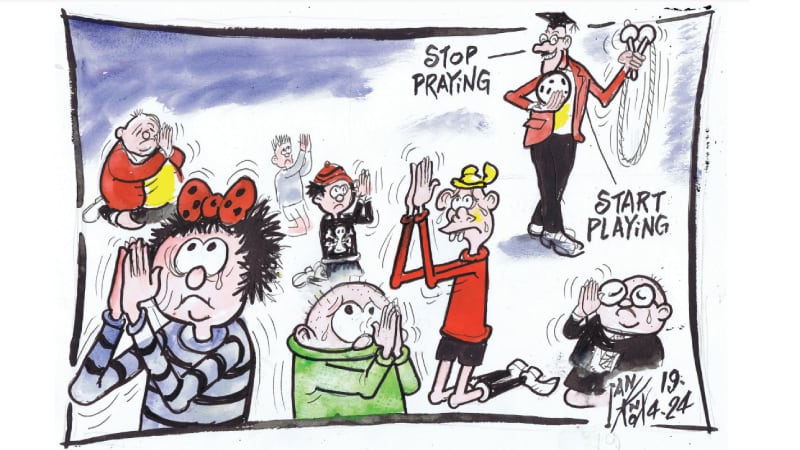Noel McCune writes (April 19) concerning the issue of Sunday trading citing the fact that he is an evangelical Christian, which would seem to emphasise his reason for the upkeep of current Sunday legislation is due to his belief in God. Despite the claimed benefits for families etc to spend time together on a Sunday, the claim for Sunday to be kept as a holy day or a day of rest is nowhere found in the Bible.
If any Christian anywhere can quote one Scripture verse where God, Jesus or any of the Apostles commanded Sunday, or the first day of the working week (according to the Bible), to be observed in any special fashion I would be most interested to learn of it. The only day cited clearly in Scripture to be remembered and kept holy, was the day sanctified by God at Creation, before the laws given at Sinai, when He rested on the seventh day, which He named ‘Shabbat’ or Sabbath, which means ‘rest’. This was further ratified in the Ten Commandments, being the longest of all the Commandments in its detail describing exactly the day and why it should be kept.
Many people fight within the ranks of the Church to ‘keep Sunday special’ when in fact it is the Sabbath (on Saturday) which is the Lord’s Day. It is the only day in the Bible which is given the title “of the Lord” – this is the Sabbath of the Lord your God.” Sunday is often referred to as the ‘Lord’s Day’ with ‘Lord’ in small letters denoting Jesus, whereas ‘LORD’ in capital letters in the Bible denotes God the Father, or YHVH, (Yahweh, Jehovah, the Hebrew Name of God).
However, Sunday is nowhere called ‘the Lord’s Day’ in Scripture, and the one verse where a tenuous link is claimed in Revelation 1:10 where the aged John the Apostle, the Disciple whom Jesus loved, said: “I was in the Spirit on the Lord’s day.” Nowhere does it say this was Sunday, or the first day of the week, or any other day. Some say it could be the Day of the LORD, the prophetic time before the return of the Lord, but the term is ‘Lord’s day’ not ‘Day of the LORD’, which appears elsewhere in both old and new testaments, but “Lord’s day” appears only this once, but most likely to be the one day which John would have observed as a Christian Jew, namely, the Sabbath of the LORD.
People may be fighting to keep Sunday as a day off but are they fighting for the wrong day?
COLIN NEVIN
Bangor, Co Down
Anti-Zionism is not anti-Semitism
Zionism is described in the dictionary as ‘a political movement for the establishment and support of a national homeland for Jews in what is now Israel’.
Anti-Semitism is defined in the dictionary thus ‘hostility to or prejudice against Jews’.
Jews are Semites. Arabs are Semites. Arabic is a Semitic language. Excluding Arabic people from the term ‘anti-Semitic’, as common usage does, is discriminatory.
When Jewish refugees fled from brutal European persecution and arrived in Palestine in the 1930s and 1940s, they initially received sanctuary among the indigenous population. It was the rapid increase in numbers, and aggressive Zionist action perpetrated by the migrants, in concert with some few disaffected native Zionists which led to conflict. This eventually resulted in what Palestinians refer to as ‘Al-Nakba’ (the Catastrophe), when 700,000 indigenous people were forced to flee the region in the face of Zionist fanaticism.
These Palestinian refugees still have the title deeds to their homes. They still have the keys to their front doors. They still wait for justice.
Zionism is a supremacist ideology that requires stolen land as befits its founding principle. Yet, as has been stated here, Palestinian land is not the only thing that Zionists have stolen. They have also misappropriated the term ‘anti-Semitic’ for their own ends.
Many Jewish people across the globe today oppose Israel and its barbaric treatment of the people of Palestine. Zionists, in a pathetic attempt at disparagement, label such conscientious objectors as ‘self-hating Jews’. To oppose a supremacist Israeli state is not anti-Semitic, nor is it anti-Jewish. It is, however, anti-Zionist… and there’s no shame in that.
ANTAN O DALA AN RI
Newry, Co Down
Struggling to keep UK ‘united’
As David Cameron struggles to convince people in the UK to stay within the EU is it now time to question his ability to keep the United Kingdom ‘united’?
David Cameron’s desire to introduce his English votes for English laws idea in order to counter the West Lothian question is in my view a non-starter.
As a member of the popular Unionist Voice I believe that the only way to counter the West Lothian question is to give England its own parliament thus turning Westminster into the Federal Parliament of the UK with the power to make and repeal federal law and be in overall control of foreign affairs, defence, the police, the NHS and the DSS.
May I also suggest that British colonies be allowed to elect members of their parliament to a federal parliament in London as the British government has responsibility for their colonies and dependent territories, foreign affairs and defence so need to have political representatives elected to Westminster in order to voice their views. May I also suggest that the Republic of Ireland be invited to rejoin the Commonwealth.
So anything other than turn the United Kingdom of Great Britain and Northern Ireland into a Federal State will simply make Northern Ireland, Wales and Scotland colonies of England rather than equal partners within the union?
JAMES ANNETT
London
Birth of NI state
James O’ Boyle (April 20) details his viewpoint regarding the birth of the NI state. George V, formally opened the new parliament in Belfast City Hall on June 22 1921. In a very conciliatory speech he appealed for peace in the whole of Ireland. Thus the unionist position, as regards the six counties, from that date onwards was unassailable. In essence the Boundary Commission proposal was a standard but classic British diplomatic success and after a suitable delay of some years produce a fudged report that could be readily shelved.
On November 7 1925 the London Morning Post published a leaked summary of the report. This was uncannily accurate as only minor land adjustments were proposed. This caused a crisis in Dublin. The unionist government easily survived the storm with territory intact. A tripartite agreement was signed in London on December 3 1925. This effectively consigned the border question to a very long period of hibernation. The report was released in 1968 as a historical document.
I conclude that June 22 1921 was the relevant date and not December 1925.
BRIAN WILSON
Craigavon, Co Armagh
Unbridgeable divide
Alex Kane (April 22) said he’s “a very old-fashioned sort of democrat”.
Absolutely. The sort of democrat who believes that Britain had the right to partition Ireland. The sort of democrat who believes that Britain has the right to claim sovereignty over Northern Ireland “in its entirety”. As he said in reference to the queen: “It takes a very particular person to unite a country around a confident belief in itself and its values and she has proved to be that person.”
Against that, you could say that the queen symbolises the unbridgeable divide between her most loyal subjects the Ulster Protestant people and the Irish people in Ireland/Northern Ireland.
MALACHY SCOTT
Belfast BT15








